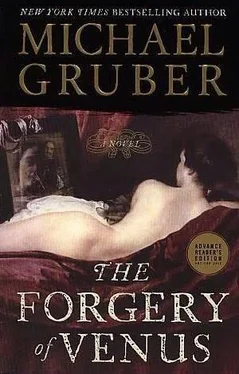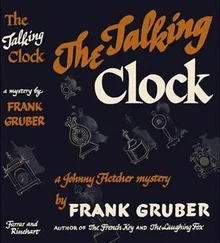The food was excellent, but I had acid on my tongue and could hardly taste it. I drank more than my share of the wine, however, and got enough of a buzz to keep me in my seat instead of running out of the place screaming hysterically. Krebs chewed away on his scampi and I wondered how he’d ever gotten used to this kind of life. I mean, he seemed like an ordinary guy, no more ruthless-in fact, maybe less ruthless-than the typical high-end New York gallery magnate.
I wanted to jab him some more, though, so I said, “Is it true, by the way, that you got your start selling pictures stolen from murdered Jews?”
“Yes,” he said blandly, “perfectly true. But as I’m sure you know, there was no question of returning these things to the rightful owners. It would be like trying to return a carving to an Assyrian or an Aztec. They were dead. I sincerely wish they hadn’t died, but I didn’t kill them. I was thirteen when the war ended. So what was I supposed to do, leave them in a Swiss vault forever?”
“An interesting moral point.”
“Yes, and I’ll tell you another one, as long as you’ve brought up the subject. My father was a Nazi and I was raised as a Nazi. Everyone of my generation was. As a boy I could not wait to be old enough to join the forces and fight for the Reich. I believed every lie they told me, as I imagine you believed the lies your country told you. Tell me, were you in Vietnam?”
“No, I was exempt. I had a kid.”
“Lucky you. According to the Vietnamese your country killed three million of their people, most of them civilians. I’m not excusing what the Nazis did, of course, just pointing out that Germany is not alone in slaughtering innocents, and for a long time the Americans supported that war. Now I will tell you an amusing story. In December of 1944 my whole family was back in Munich and the city was being bombed day and night. My father was naturally concerned for the safety of his family, and so he pulled strings and got us out of there, to a place that had never been bombed and which was considered quite safe. Do you know where this was? It was Dresden. We were there in February when the Allies burnt the city to the ground. I survived; my mother did not. I hid in the sewers.”
Here he drank some wine and let loose a small sigh.
“After the bombing I went back to where our house had been and there was nothing but ash. My mother had turned into a little black manikin one meter long. We scraped her off the cellar wall with pieces of a smashed toilet. And then the war was over and we learned the full story of our shame, and so we were not allowed to voice the suffering we had experienced. This destruction, this slaughter of children, these thousands of rapes we endured could not be acknowledged. It was our just recompense, our nemesis. And so most of my generation picked ourselves up and went on with life and rebuilt our country.”
He paused and I said, “What does that have to do with-”
He held up his fork. “Wait, be patient, I will get to that. So we all participated in rebuilding the country, but there were scars that could never be mentioned. Some of us never recovered from the disillusion, this massive betrayal, this nursery of lies in which we were raised. We were forever cut off from our fellow citizens, because any idea of a shared culture, our heimat, had been poisoned. The Nazis were very clever: they understood that to create a great evil you must pervert a great good, and this was our love of nation and family and culture.
“And when I asked my father what he had done in the war, he answered me honestly, and when I heard of it, I was not shocked, I did not reject him, because I knew in my heart I was no better than him, and I did not join the self-righteous of my generation, the ones who supposed they would have behaved so much more nobly than their parents in the same situation. So I became the person I am today. After my art studies were complete, I went to Switzerland and forged provenances and sold the paintings of the dead Jews without a single qualm. I said to myself that I was returning beauty to the world. Perhaps a self-serving lie, but, as I have suggested already, who does not tell themselves such lies? Yet the beauty is real, perhaps the only real thing there is. It does not save us, but it is better, I think, for there to be beauty than not. You have created a thing of great beauty, deep beauty, a thing that will last for as long as there are men to see it, and they will love it the more if they think it came from the hand of Diego Velázquez. This is foolishness, of course-the thing is the thing-yet who shall blame us if we profit from this foolishness? What legitimate business does not?”
“Well, gosh, you convinced me,” I said. “Now I can’t wait to forge again,” and he laughed and slapped the table.
“That is why I like you, Wilmot. One needs a sense of humor in this business, and also a certain cynicism. I tell you the most painful moments of my life, with Germanic seriousness and weltschmerz, and you make a joke of it. But one thing I cannot let slip, and that is the accusation that I am not a patron of your own work. In fact, I am. I believe that once you are freed from the necessity of whoring for the galleries and the commercial arts you will truly blossom as a painter. Those two little drawings prove it, and it will give me a great deal of personal satisfaction to see you do this.”
“You don’t think it’s too late?”
“Of course not! Who knew of Joseph Cornell until he was older than you? Even Cézanne sold hardly a painting until he was your age. And nowadays, with enough resources, one can secure a reputation. You would be surprised at how entirely corruptible is the world of art criticism. And you are good besides. I could make reputations for painters who do not have the talent that is in your little finger.”
He put down his fork and looked at the empty scampi shells with satisfaction. Mine remained half finished, and when the waiter came by I told him to take it away.
Krebs said, “I hope what I have been saying has not affected your appetite. No? Good, then perhaps we might now speak of this drug you have taken and the illusion that you are living the life of Velázquez.”
Well, obviously he’d gotten the story from Mark, I mean the early experiences in New York, and I told him the rest, about how I’d spent 1650 in Rome, while we enjoyed dishes of wild strawberries capriccio dio Wanda, cups of espresso, and a finale of grappa. The bottle was left at the table, and I had several.
When I’d finished talking, he said, “Well, I wouldn’t have believed it if I had not heard it from your own lips.”
“I still don’t believe it, and it happened to me.”
“Yes, and let me say, better you than me, Wilmot. I would not take such a drug for any consideration.”
“Why not? You could end up Holbein.”
“Yes, or Bosch. Or standing up to my nose in shit in a Dresden sewer for ten hours. Again.” He shuddered. “In any case, an interesting phenomenon. You ingest a drug and you experience events outside the bounds of rational explanation. Tell me, are you familiar with the theory that we have five bodies?”
“No,” I said, “but I’m not sure I want to know about it, if it’s going to scare me worse than I am already.”
He smiled like the mad scientist in a bad movie, mock sadistically, or maybe not that mock. “Yes, so first we have the body that science and medicine deal with, the meat, the nerves and chemicals and so on. Then we have the second, the representation of the body in the mind, which does not always match the reality of the first-phantom limbs and so on-plus the sense of ourselves and the recognition that this thing also exists in others, as when we feel the loom of another person close to us or look into another’s eyes.”
Читать дальше












